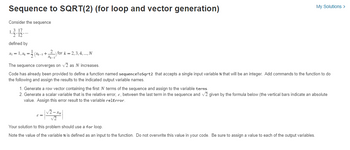
Database System Concepts
7th Edition
ISBN: 9780078022159
Author: Abraham Silberschatz Professor, Henry F. Korth, S. Sudarshan
Publisher: McGraw-Hill Education
expand_more
expand_more
format_list_bulleted
Concept explainers
Question
Please solve this

Transcribed Image Text:Sequence to SQRT(2) (for loop and vector generation)
Consider the sequence
1.3.1/12
defined by
x₁ = 1, x₁ =
(xx-1 + 2) for k = 2, 3, 4,... N
The sequence converges on √2 as N increases.
Code has already been provided to define a function named sequenceToSqrt2 that accepts a single input variable N that will be an integer. Add commands to the function to do
the following and assign the results to the indicated output variable names.
My Solutions >
1. Generate a row vector containing the first N terms of the sequence and assign to the variable terms.
2. Generate a scalar variable that is the relative error, &, between the last term in the sequence and √2 given by the formula below (the vertical bars indicate an absolute
value. Assign this error result to the variable relError.
ε =
Your solution to this problem should use a for loop.
Note the value of the variable N is defined as an input to the function. Do not overwrite this value in your code. Be sure to assign a value to each of the output variables.
Expert Solution
This question has been solved!
Explore an expertly crafted, step-by-step solution for a thorough understanding of key concepts.
This is a popular solution
Trending nowThis is a popular solution!
Step by stepSolved in 3 steps

Knowledge Booster
Learn more about
Need a deep-dive on the concept behind this application? Look no further. Learn more about this topic, computer-science and related others by exploring similar questions and additional content below.Similar questions
- no ai generated please, solve with greatest of details mke sure all calculations are correct i repeat no ai generated pleasearrow_forwardWhich of the following conditions must be satisfied to solve critical section? O a. none of them O b. progress O c. all the mentioned O d. mutual exclusion e. bounded waitingarrow_forwardLet x and y be integers such that x = 3 (mod 10) and y = 5 (mod 10). Find the integer z such that 97x + 3y³ z (mod 10) and 0 ≤ z ≤9.arrow_forward
- 1. (a)The objective is to shuffle a given array of n different elements. You would like to compare various shuffling algorithms and select the best of them. What does it mean: “the best shuffling algorithm”? What is a requirement for the perfect shuffling algorithm? (b) Is the Fisher-Yates Shuffle the perfect shuffling algorithm? Present a formal mathematical proof that this algorithm meets (or does not meet) the requirement given in (a). (c) Evaluate empirically performance of the Fisher-Yates Shuffle for selected numerical values of n. Propose your evaluation criteria and explain your evaluation methodology. Report your observations and conclusions.arrow_forwardQuestion 4: Use a proof by contradiction to prove that the sum of an irrational number x and a rational number y is irrational.arrow_forward10. Which of the following best describes the existence of undecidable problems? A. Undecidable problems are problems for which more than one algorithm solves the problem and computer scientists have not yet chosen the algorithm they believe is best B. Undecidable problems are problems for which an algorithm can be written that will produce the same output for at least two possible inputs C. Undecidable problems are problems for which an algorithm can be written that produces a correct output for all inputs but in an unreasonable time D. An undecidable problem is a problem for which no algorithm can be constructed that always produces a correct output MacBook Pro 000arrow_forward
- Please show the steps on how to accomplish this task 2. For equation X^2=X among infinite from left numbers there are 3 known solution: 0= ...00000, 1= ...00001 and 5^2^infinity = ...12890625. Give last 8 digits of one more solution whose last digit is 6: ...??????????6arrow_forwardplease solve it ASAP!!! show ALL the steps please THANK YOUarrow_forwardPlease answer D,E, and Farrow_forward
arrow_back_ios
SEE MORE QUESTIONS
arrow_forward_ios
Recommended textbooks for you
 Database System ConceptsComputer ScienceISBN:9780078022159Author:Abraham Silberschatz Professor, Henry F. Korth, S. SudarshanPublisher:McGraw-Hill Education
Database System ConceptsComputer ScienceISBN:9780078022159Author:Abraham Silberschatz Professor, Henry F. Korth, S. SudarshanPublisher:McGraw-Hill Education Starting Out with Python (4th Edition)Computer ScienceISBN:9780134444321Author:Tony GaddisPublisher:PEARSON
Starting Out with Python (4th Edition)Computer ScienceISBN:9780134444321Author:Tony GaddisPublisher:PEARSON Digital Fundamentals (11th Edition)Computer ScienceISBN:9780132737968Author:Thomas L. FloydPublisher:PEARSON
Digital Fundamentals (11th Edition)Computer ScienceISBN:9780132737968Author:Thomas L. FloydPublisher:PEARSON C How to Program (8th Edition)Computer ScienceISBN:9780133976892Author:Paul J. Deitel, Harvey DeitelPublisher:PEARSON
C How to Program (8th Edition)Computer ScienceISBN:9780133976892Author:Paul J. Deitel, Harvey DeitelPublisher:PEARSON Database Systems: Design, Implementation, & Manag...Computer ScienceISBN:9781337627900Author:Carlos Coronel, Steven MorrisPublisher:Cengage Learning
Database Systems: Design, Implementation, & Manag...Computer ScienceISBN:9781337627900Author:Carlos Coronel, Steven MorrisPublisher:Cengage Learning Programmable Logic ControllersComputer ScienceISBN:9780073373843Author:Frank D. PetruzellaPublisher:McGraw-Hill Education
Programmable Logic ControllersComputer ScienceISBN:9780073373843Author:Frank D. PetruzellaPublisher:McGraw-Hill Education

Database System Concepts
Computer Science
ISBN:9780078022159
Author:Abraham Silberschatz Professor, Henry F. Korth, S. Sudarshan
Publisher:McGraw-Hill Education

Starting Out with Python (4th Edition)
Computer Science
ISBN:9780134444321
Author:Tony Gaddis
Publisher:PEARSON

Digital Fundamentals (11th Edition)
Computer Science
ISBN:9780132737968
Author:Thomas L. Floyd
Publisher:PEARSON

C How to Program (8th Edition)
Computer Science
ISBN:9780133976892
Author:Paul J. Deitel, Harvey Deitel
Publisher:PEARSON

Database Systems: Design, Implementation, & Manag...
Computer Science
ISBN:9781337627900
Author:Carlos Coronel, Steven Morris
Publisher:Cengage Learning

Programmable Logic Controllers
Computer Science
ISBN:9780073373843
Author:Frank D. Petruzella
Publisher:McGraw-Hill Education